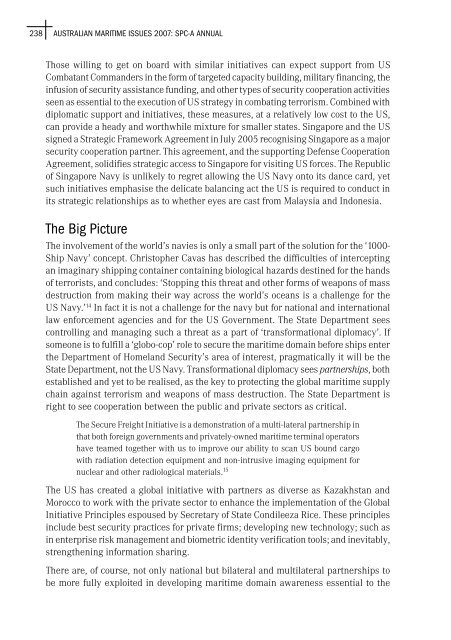Australian Maritime Issues 2007 - Royal Australian Navy
Australian Maritime Issues 2007 - Royal Australian Navy
Australian Maritime Issues 2007 - Royal Australian Navy
Create successful ePaper yourself
Turn your PDF publications into a flip-book with our unique Google optimized e-Paper software.
238 AUSTRALIAN MARITIME ISSUES <strong>2007</strong>: SPC-A ANNUAL<br />
Those willing to get on board with similar initiatives can expect support from US<br />
Combatant Commanders in the form of targeted capacity building, military financing, the<br />
infusion of security assistance funding, and other types of security cooperation activities<br />
seen as essential to the execution of US strategy in combating terrorism. Combined with<br />
diplomatic support and initiatives, these measures, at a relatively low cost to the US,<br />
can provide a heady and worthwhile mixture for smaller states. Singapore and the US<br />
signed a Strategic Framework Agreement in July 2005 recognising Singapore as a major<br />
security cooperation partner. This agreement, and the supporting Defense Cooperation<br />
Agreement, solidifies strategic access to Singapore for visiting US forces. The Republic<br />
of Singapore <strong>Navy</strong> is unlikely to regret allowing the US <strong>Navy</strong> onto its dance card, yet<br />
such initiatives emphasise the delicate balancing act the US is required to conduct in<br />
its strategic relationships as to whether eyes are cast from Malaysia and Indonesia.<br />
The Big Picture<br />
The involvement of the world’s navies is only a small part of the solution for the ‘1000-<br />
Ship <strong>Navy</strong>’ concept. Christopher Cavas has described the difficulties of intercepting<br />
an imaginary shipping container containing biological hazards destined for the hands<br />
of terrorists, and concludes: ‘Stopping this threat and other forms of weapons of mass<br />
destruction from making their way across the world’s oceans is a challenge for the<br />
US <strong>Navy</strong>.’ 14 In fact it is not a challenge for the navy but for national and international<br />
law enforcement agencies and for the US Government. The State Department sees<br />
controlling and managing such a threat as a part of ‘transformational diplomacy’. If<br />
someone is to fulfill a ‘globo-cop’ role to secure the maritime domain before ships enter<br />
the Department of Homeland Security’s area of interest, pragmatically it will be the<br />
State Department, not the US <strong>Navy</strong>. Transformational diplomacy sees partnerships, both<br />
established and yet to be realised, as the key to protecting the global maritime supply<br />
chain against terrorism and weapons of mass destruction. The State Department is<br />
right to see cooperation between the public and private sectors as critical.<br />
The Secure Freight Initiative is a demonstration of a multi-lateral partnership in<br />
that both foreign governments and privately-owned maritime terminal operators<br />
have teamed together with us to improve our ability to scan US bound cargo<br />
with radiation detection equipment and non-intrusive imaging equipment for<br />
nuclear and other radiological materials. 15<br />
The US has created a global initiative with partners as diverse as Kazakhstan and<br />
Morocco to work with the private sector to enhance the implementation of the Global<br />
Initiative Principles espoused by Secretary of State Condileeza Rice. These principles<br />
include best security practices for private firms; developing new technology; such as<br />
in enterprise risk management and biometric identity verification tools; and inevitably,<br />
strengthening information sharing.<br />
There are, of course, not only national but bilateral and multilateral partnerships to<br />
be more fully exploited in developing maritime domain awareness essential to the
















